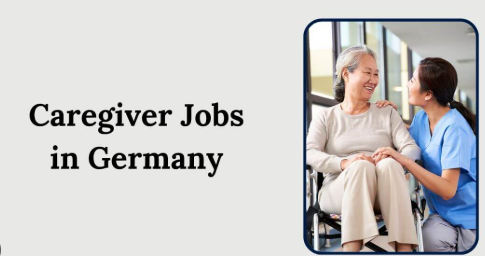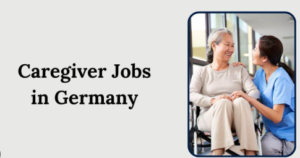
Visa Sponsorship Caregiver Jobs in Germany 2025 – International Applicants
Visa Sponsorship Caregiver Jobs in Germany 2025 – International Applicants Are you looking to start a new life and career in Europe? If so, Germany might just be your next destination! With its aging population and shortage of local healthcare workers, Germany is actively hiring caregivers from abroad—and yes, many employers offer visa sponsorship to international applicants.
In this article, we’ll walk you through everything you need to know about caregiver jobs in Germany with visa sponsorship in 2025, how to apply, and what to expect once you land the job.
Why Germany Needs International Caregivers
Germany has one of the fastest-aging populations in Europe. By 2030, nearly 30% of the population will be over 60 years old. This has created a major demand for caregivers in nursing homes, hospitals, and private homes. Since the local workforce isn’t enough to meet this demand, the government has opened its doors to international talent.
Overview of the Caregiving Sector in Germany
Caregiving in Germany isn’t just about physical assistance; it involves emotional and social care too. Caregivers often help elderly or disabled individuals with everyday tasks like bathing, dressing, eating, and taking medication. Jobs are available in private households, retirement homes, and healthcare facilities.
Understanding Visa Sponsorship in Germany
What is Visa Sponsorship?
Visa sponsorship means that your future employer in Germany will help you obtain a work visa by providing an official job offer and the necessary documentation. This makes it easier for you to legally live and work in the country.
How Visa Sponsorship Works for Caregivers
Employers apply for permission to hire a foreign worker. Once approved, they provide you with a contract and a formal invitation. You then use this to apply for a German work visa through your local German embassy or consulate.
Types of Caregiver Jobs Available
Elderly Care
Most caregiver roles are focused on elderly care. Tasks include feeding, mobility assistance, and companionship.
Disability Support Workers
These jobs involve supporting individuals with mental or physical disabilities to live independently.
In-Home vs Facility-Based Caregiving
Some jobs are based in private homes (live-in caregivers), while others are in hospitals, nursing homes, or assisted living facilities.
Who Can Apply?
Eligibility Criteria
- Must be at least 18 years old
- Good physical and mental health
- Clean criminal record
- Willingness to relocate
Qualifications Required
While formal education isn’t always mandatory, having a diploma or certificate in healthcare or nursing is a big plus. Some employers also accept candidates with training or experience in elderly or disability care.
Language Proficiency
Basic knowledge of German (at least A2-B1 level) is usually required. Some employers offer language training or give you time to learn after arrival.

How to Apply for Caregiver Jobs with Sponsorship
Finding Jobs Online
Start by checking popular German job websites such as:
Applying Through Recruitment Agencies
Agencies like Promedis24, CareWithCare, and Internationaler Bund specialize in placing foreign workers into caregiving jobs with visa support.
Direct Application to Employers
Some large nursing homes and hospitals advertise directly on their websites. Prepare a German-style CV and send your application via email.
Top Websites and Platforms to Find Caregiver Jobs
- Make-it-in-Germany.com – Official government platform
- EURES – European Job Mobility Portal
- Care.com/de – Private care job listings
- LinkedIn – Search and connect with recruiters
- Facebook Groups – Try searching for “Caregiver Jobs Germany Visa Sponsorship”
Required Documents for Visa Sponsorship
Resume and Experience Certificates
Make sure your CV is up-to-date and tailored for a German employer. Include references and any caregiving experience.
Educational Qualifications
Include diplomas, training certificates, or health care-related courses.
Valid Passport and Health Check Records
A valid passport, medical checkup, and vaccination records are commonly required during the visa process.
German Work Visa Process for Caregivers
Steps Involved in Getting a Visa
- Secure a job offer with sponsorship.
- Gather all required documents.
- Apply for a national D visa (work visa).
- Attend the visa interview.
- Wait for approval and move to Germany.
Timeline and Processing Duration
Visa processing usually takes 6 to 12 weeks depending on your country of residence and embassy workload.
Cost of the Visa Process
Expect to pay €75–€100 for the visa application, plus any fees for document translation and notarization.
Salary and Benefits
Average Salary for Caregivers
The average caregiver earns between €2,000 to €2,800 per month before tax. Live-in caregivers may receive less, but housing and food are included.
Working Hours and Conditions
- Typically 35–40 hours per week
- Paid holidays and overtime
- Night shifts and weekend work may offer bonuses
Additional Perks
- Health insurance
- Paid sick leave
- Pension contributions
- Free or discounted accommodation
Challenges Faced by International Caregivers
Cultural Adjustment
Adapting to German work culture and daily life can take time, especially with differences in food, weather, and lifestyle.
Work-Life Balance
Shift work may interfere with social or family life, especially for live-in caregivers.
Language Barriers
Communication with clients and coworkers can be tough at first, but learning German makes a big difference.
Success Stories of International Caregivers in Germany
Many caregivers from countries like the Philippines, India, Kenya, and Ukraine have successfully built careers in Germany. Some have even brought their families and gained permanent residency.
Tips for a Successful Caregiver Career in Germany
Building a Professional Network
Join expat and healthcare forums to connect with fellow caregivers and find support.
Continuing Education and Training
Attend local training programs to boost your skills and increase your salary potential.
Learning the German Language
Take language courses seriously—it’s the key to better integration and career growth.
German Cities with High Demand for Caregivers
Berlin
Germany’s capital offers numerous jobs, especially in elder care homes.
Munich
Higher wages, but also a higher cost of living. Ideal for those seeking a vibrant city life.
Frankfurt
Home to many international hospitals and diverse communities, making it welcoming for foreigners.
Government Initiatives Supporting Foreign Caregivers
Integration Programs
Government-backed programs help foreigners adapt by offering language courses and cultural orientation.
Legal Support and Protection
Foreign workers have the same labor rights as locals. If mistreated, you can report your employer to the labor office.
Opportunities for Permanent Residency
After working for several years, you can apply for permanent residency and even bring your family to join you.
How To Apply
Apply Now
Conclusion
Germany is actively seeking skilled and passionate caregivers from around the world—and it’s never been easier to get started with visa sponsorship options in 2025. Whether you’re looking for a fresh start or want to grow in the caregiving field, Germany offers real opportunities with good pay, legal protection, and long-term career potential. So why wait? Start preparing today and take that leap toward a brighter future.
FAQs
1. Can I apply for caregiver jobs in Germany without experience?
Yes, but having prior experience or a certificate in caregiving increases your chances significantly.
2. How long does it take to get a caregiver visa?
Typically 6 to 12 weeks, depending on your home country and the German embassy workload.
3. Is German language mandatory?
In most cases, yes. At least A2-B1 level is often required. Some employers may help you learn the language.
4. Can I bring my family with me to Germany?
Yes, after securing stable employment, you may apply for family reunification visas.
5. What is the age limit to apply?
There’s no official age limit, but most employers prefer candidates aged 21 to 45.
